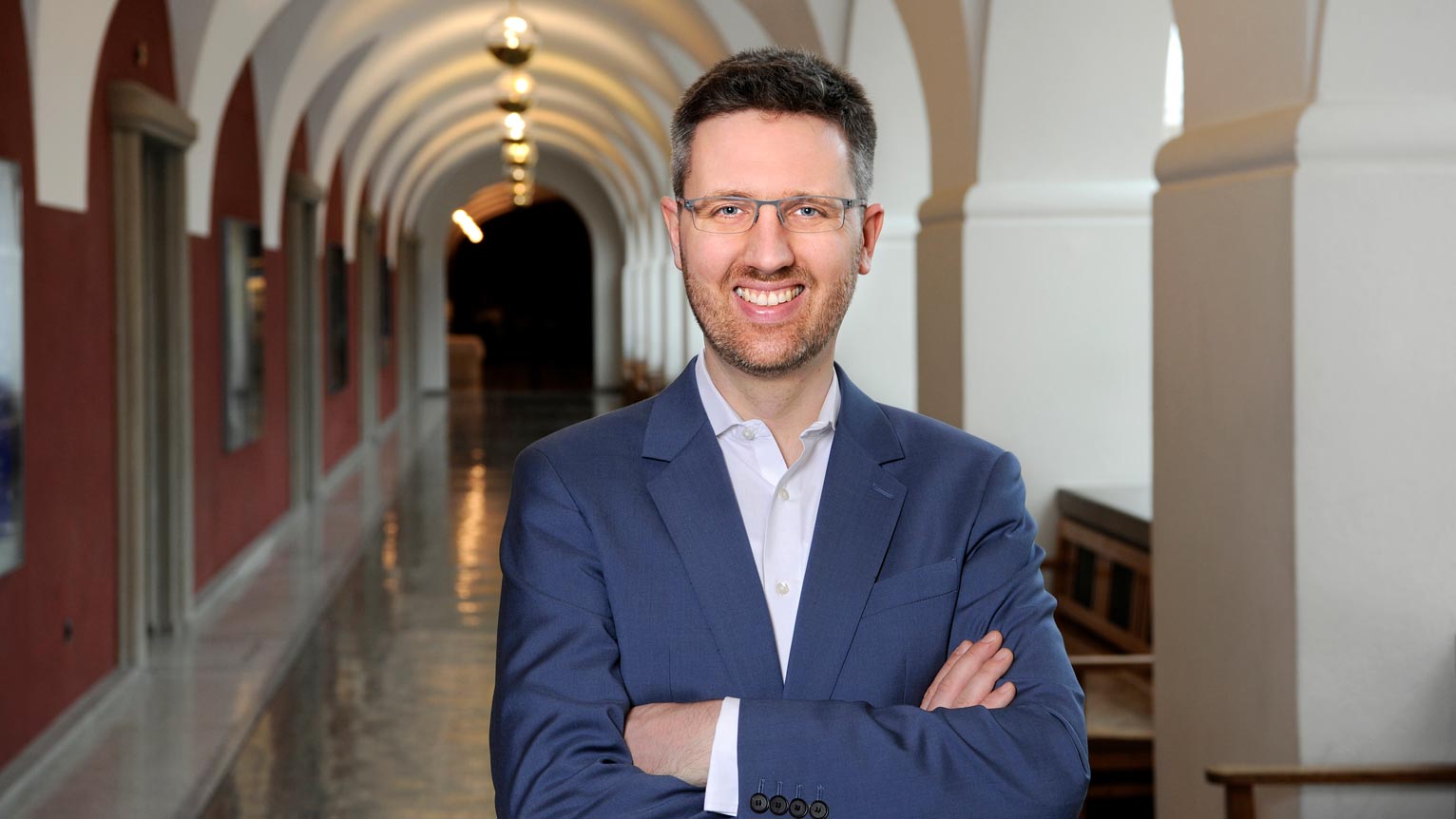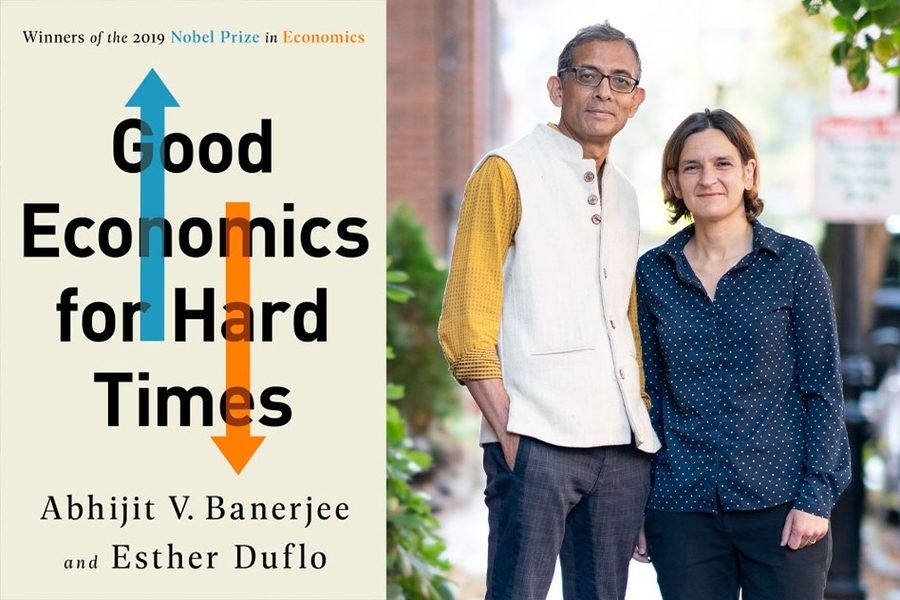In the media
The Center’s affiliated researchers actively participate in public discussions on current issues and provide expert advice to government organizations and decision makers.
Pandemic and Economics
Expert knowledge was once again in high demand in the second year of the pandemic – especially in terms of the crisis’s social and economic impact. Florian Scheuer commented in the media on rising inequality as a result of the pandemic, stating that increasing wealth inequality can also be observed in Switzerland. Economic historian Hans-Joachim Voth provided a comparison of the current situation with past pandemics, like the plague and the Spanish flu. While there are many similarities, he considers a similar economic boom – that one following the Roaring Twenties – to be unlikely. An assessment of the global economy was provided by globalization expert David Dorn, who emphasized that free trade has not failed. On the contrary, the global economy was able to play to its strengths during the pandemic. But globalization also creates net losers.
Who is afraid of high wages?
Do minimum wages really lead to higher unemployment? Are high wages detrimental to productivity or do they pave the way for innovation and creative solutions? Hans-Joachim Voth took a closer look at what higher wages really mean for an economy and whether economic theory reflects real life.
Global minimum tax effects
Florian Scheuer discussed new proposals for a global minimum tax, possible repercussions and challenges for Switzerland, and what Switzerland can do to remain attractive to big corporations.
The Center’s affiliated researchers actively participate in public discussions on current issues and provide expert advice to government organizations and decision makers.
Pandemic and Economics
Expert knowledge was once again in high demand in the second year of the pandemic – especially in terms of the crisis’s social and economic impact. Florian Scheuer commented in the media on rising inequality as a result of the pandemic, stating that increasing wealth inequality can also be observed in Switzerland. Economic historian Hans-Joachim Voth provided a comparison of the current situation with past pandemics, like the plague and the Spanish flu. While there are many similarities, he considers a similar economic boom – that one following the Roaring Twenties – to be unlikely. An assessment of the global economy was provided by globalization expert David Dorn, who emphasized that free trade has not failed. On the contrary, the global economy was able to play to its strengths during the pandemic. But globalization also creates net losers.
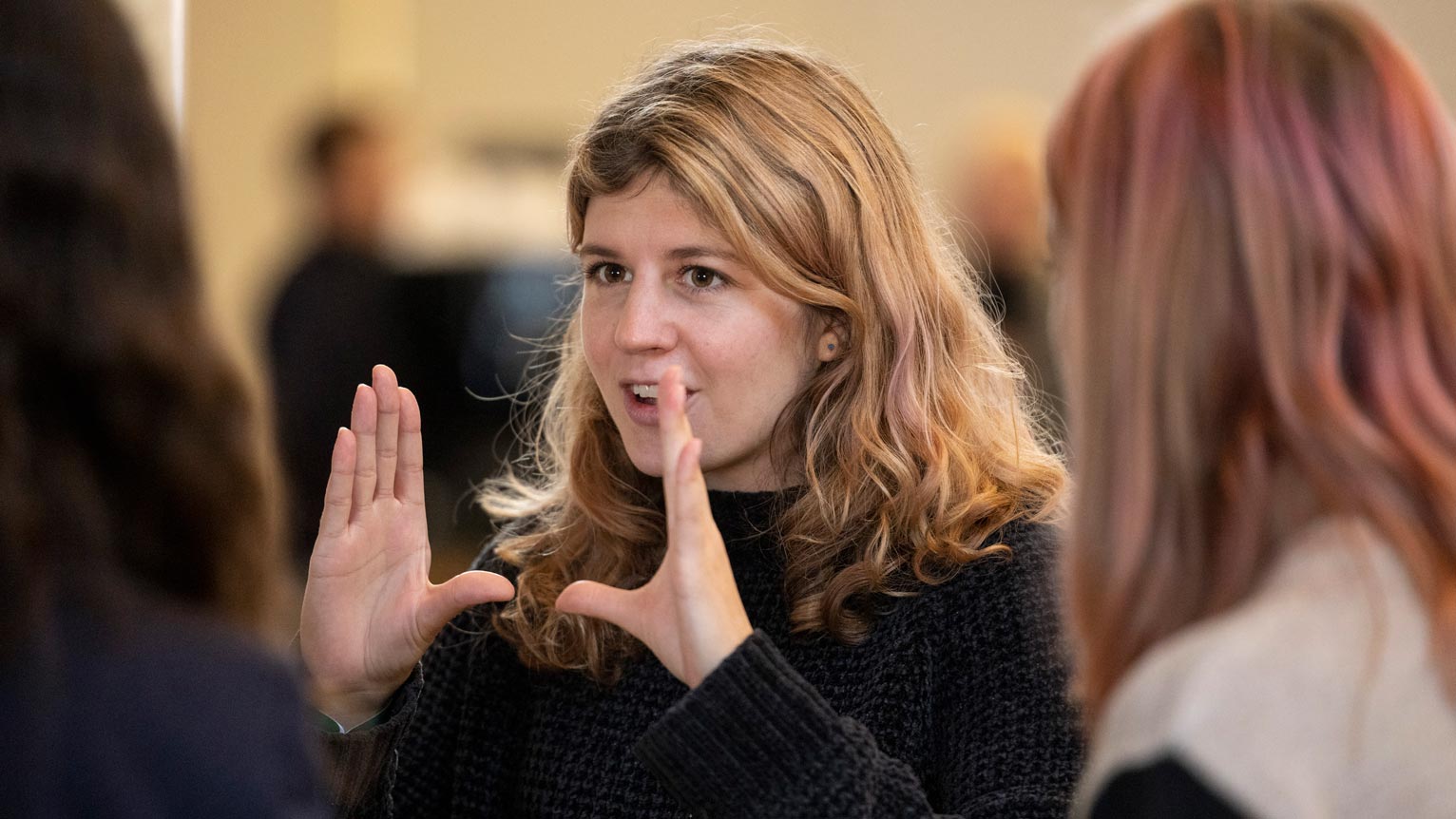
Events 2021
Healthcare and pension provision (Wirtschaftspodium Schweiz)
The pandemic is a stress test for the Swiss social systems. How is the healthcare system performing? What does the crisis mean for retirement provision – is it even an opportunity for reform? In the two-part online edition of Wirtschaftspodium Schweiz, experts from business, science and politics discussed novel solutions to familiar problems.
Disappearing middle class (Economics of global challenges)
Nir Jaimovich, Affiliated Professor at the UBS Center, showed that in the last four decades, many industrialized economies have experienced the phenomenon of “job polarization,” where the fraction of the population working in middle-waged jobs has dropped. This process has been linked to automation, which replaces specific tasks of human labor. What happens to people who possess skills that are being replaced? And what options do governments have for coping with such changes?
The economic geography of global warming (Economics of global challenges)
In his webcast, Prof. Esteban Rossi-Hansberg (University of Chicago) explained the large heterogenous impacts of climate change across regions. How people cope with global warming – by migrating, trading, and investing – is crucial for the effectiveness of different policy actions.
Do giant firms undermine competition and social welfare? (Economics of global challenges)
In an era of technological progress and easy communication, it might seem reasonable to assume that the world’s working people have never had it so good. But wages are stagnant, and prices are rising. Economist Jan Eeckhout showed in his webcast how this is due to a small number of companies taking advantage of new technologies to charge ever-higher increasing prices.
Sustainability and climate change (Forum for Economic Dialogue)
Coinciding with COP 26, the UBS Center Forum produced important insights into the climate debate and generated lively discussions among the speakers. While the devastating consequences of global warming – especially for the world’s most vulnerable people – were acknowledged by all, there was intense debate about the different measures that can be taken to fight climate change. Which measures are effective, efficient, and socially acceptable – e.g., carbon tax, innovation, or green bonds? How much will they cost and who should pay for them? Here, opinions differed, especially on the question of whether the costs we incur for the measures are proportionate. The highlight and conclusion of the Forum was the Zurich Lecture delivered by Nobel laureate Jean Tirole, who on the one hand emphasized the importance of sustainable policies and on the other voiced criticism of questionable good ideas, such as green central banks or the inclusion of environmental criteria in public procurement.
Healthcare and pension provision (Wirtschaftspodium Schweiz)
The pandemic is a stress test for the Swiss social systems. How is the healthcare system performing? What does the crisis mean for retirement provision – is it even an opportunity for reform? In the two-part online edition of Wirtschaftspodium Schweiz, experts from business, science and politics discussed novel solutions to familiar problems.
Disappearing middle class (Economics of global challenges)
Nir Jaimovich, Affiliated Professor at the UBS Center, showed that in the last four decades, many industrialized economies have experienced the phenomenon of “job polarization,” where the fraction of the population working in middle-waged jobs has dropped. This process has been linked to automation, which replaces specific tasks of human labor. What happens to people who possess skills that are being replaced? And what options do governments have for coping with such changes?
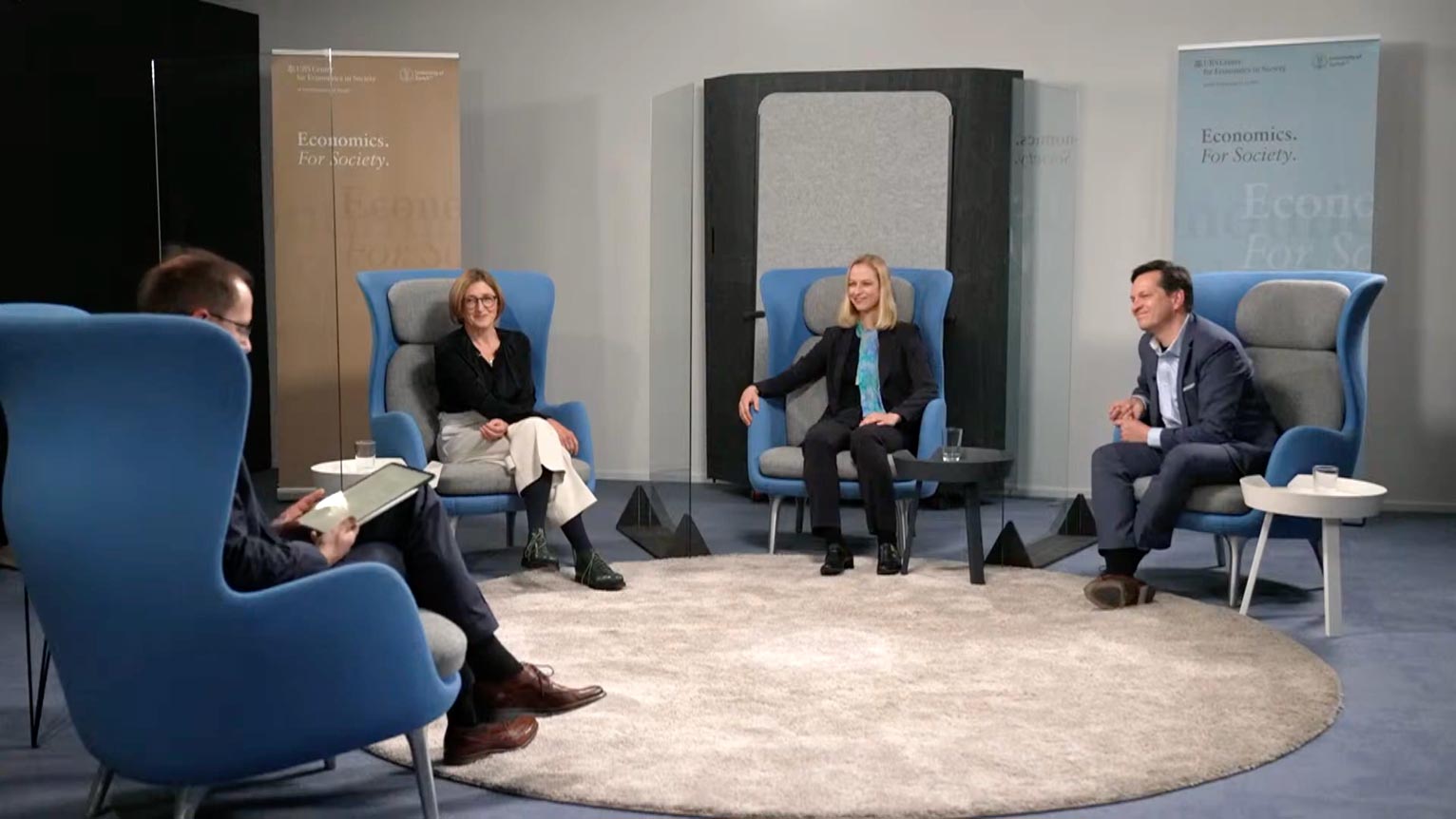
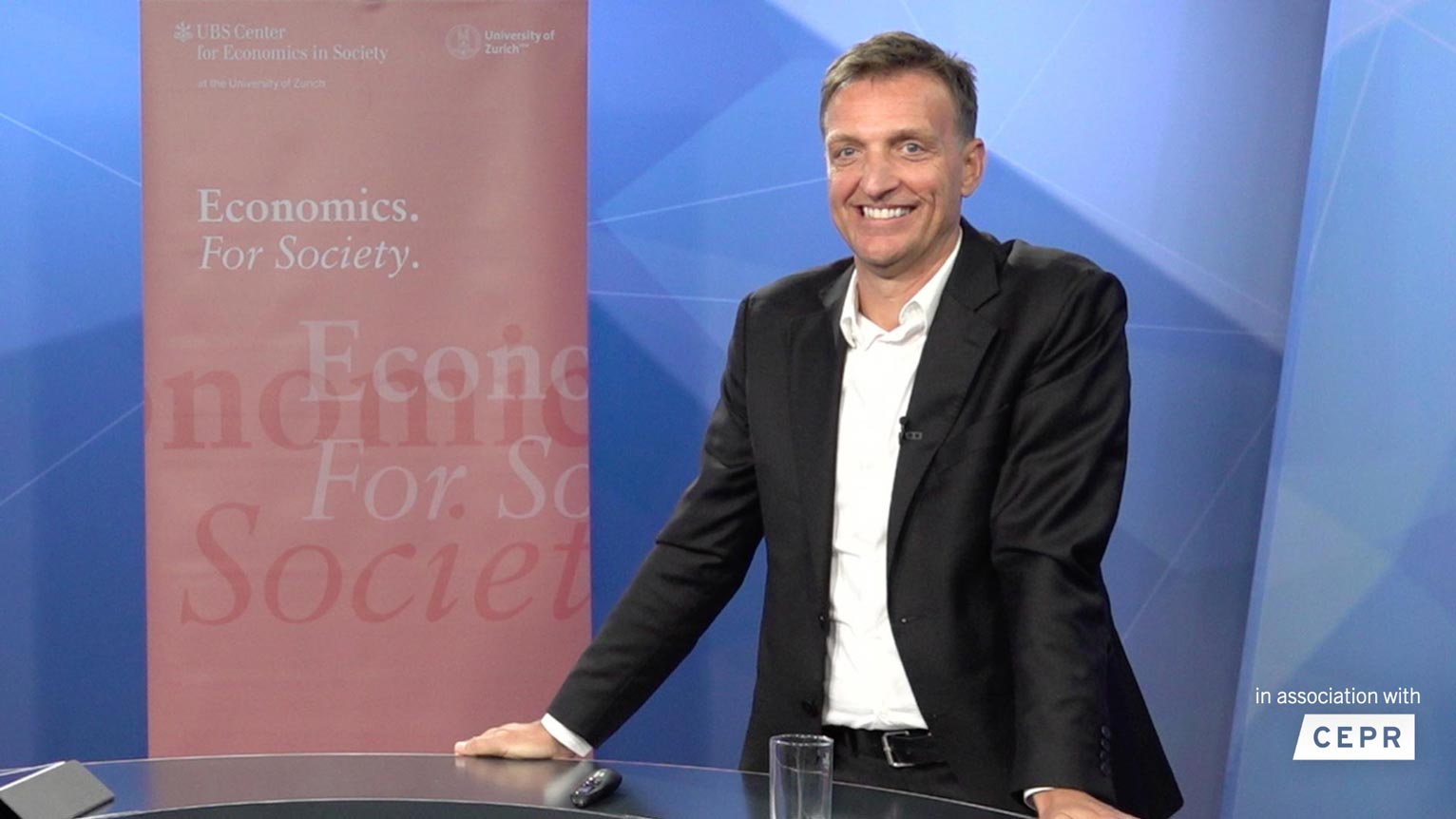
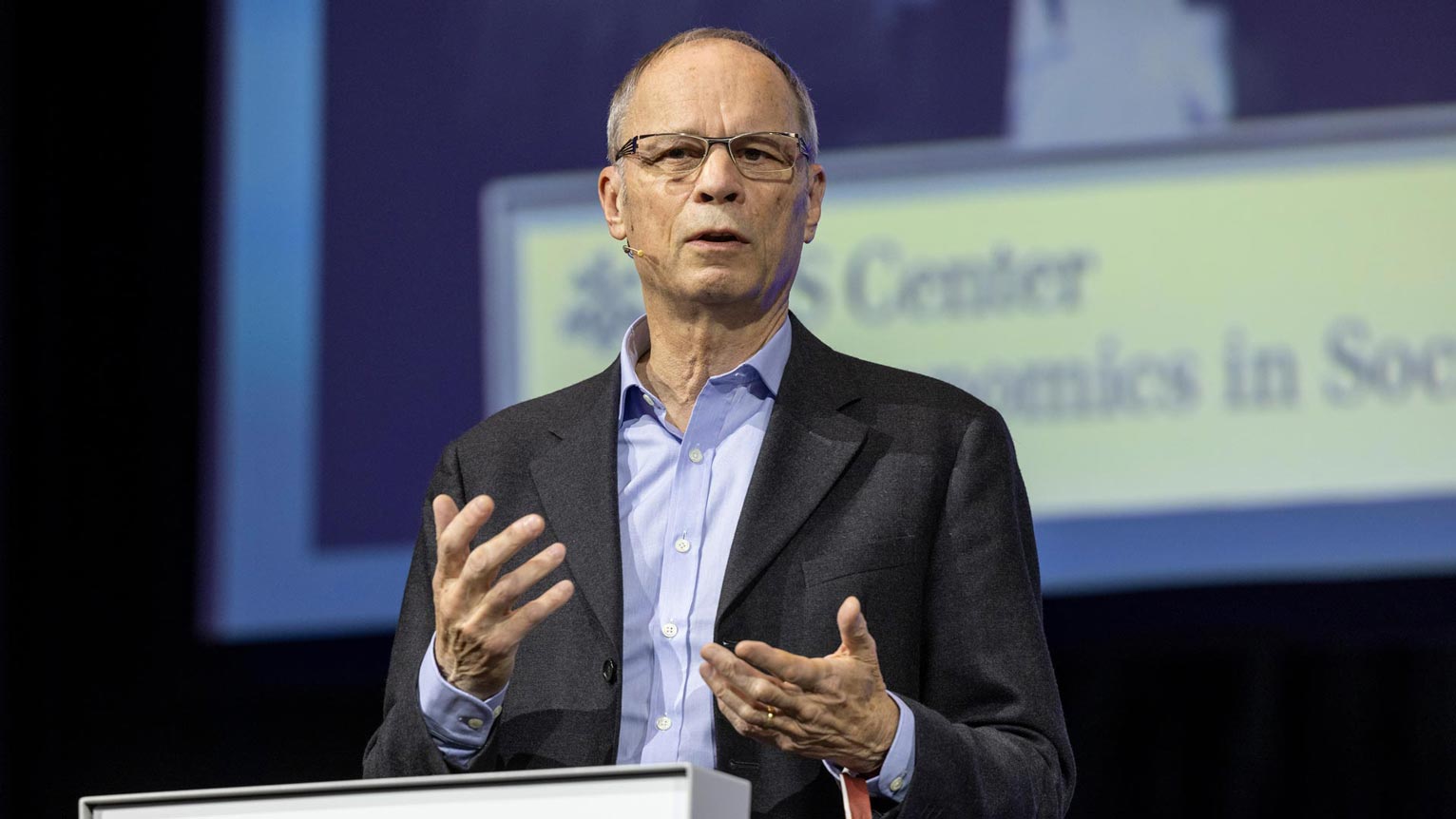
Center publications
The UBS Center offers two publication series. The Public Paper series makes research on topics of key social relevance available to a broader audience in a simplified, compact, and highly readable format. The Policy Brief series can give governments and businesses the rigorous and clear insights necessary for informed debates and decisions. They are a condensed and non-technical version of some of our top research papers.
Green innovation policies (Public paper)
Our ability to reduce greenhouse gas emissions will determine how fast we can stop global warming. In his Public Paper, UBS Foundation Professor David Hémous explains that achieving the necessary reduction in emissions – while maintaining (and improving) worldwide living standards – can only be accomplished through innovation. Innovation has the potential to combine the necessary decline in greenhouse gas emissions with sustained economic growth; and it responds largely and rapidly to price signals. However, innovation is not a silver bullet. It is conducted by scientists and firms, it reacts to market and policy incentives, and needs therefore to be regulated by governments.
The rise of superstar firms (Policy brief)
Over the past 30 years, labor’s share of GDP in industrialized countries has fallen. This means that a declining fraction of aggregate income is going to workers, while firm owners obtain more. This Policy Brief by UBS Foundation Professor David Dorn explains this phenomenon by identifying so-called ‘‘superstar’’ firms as drivers of the falling labor share.
Impact of parental leave on companies (Policy brief)
Most of the existing evidence on the effectiveness of family leave policies stems from research on the impact on the families concerned, rather than the effects and costs on employers or fellow workers. In contrast, this Policy Brief by Anne Brenøe, Professor at the Department of Economics, University of Zurich, examines the consequences of a female worker giving birth and taking parental leave on her employer and co-workers.
The UBS Center offers two publication series. The Public Paper series makes research on topics of key social relevance available to a broader audience in a simplified, compact, and highly readable format. The Policy Brief series can give governments and businesses the rigorous and clear insights necessary for informed debates and decisions. They are a condensed and non-technical version of some of our top research papers.
Green innovation policies (Public paper)
Our ability to reduce greenhouse gas emissions will determine how fast we can stop global warming. In his Public Paper, UBS Foundation Professor David Hémous explains that achieving the necessary reduction in emissions – while maintaining (and improving) worldwide living standards – can only be accomplished through innovation. Innovation has the potential to combine the necessary decline in greenhouse gas emissions with sustained economic growth; and it responds largely and rapidly to price signals. However, innovation is not a silver bullet. It is conducted by scientists and firms, it reacts to market and policy incentives, and needs therefore to be regulated by governments.
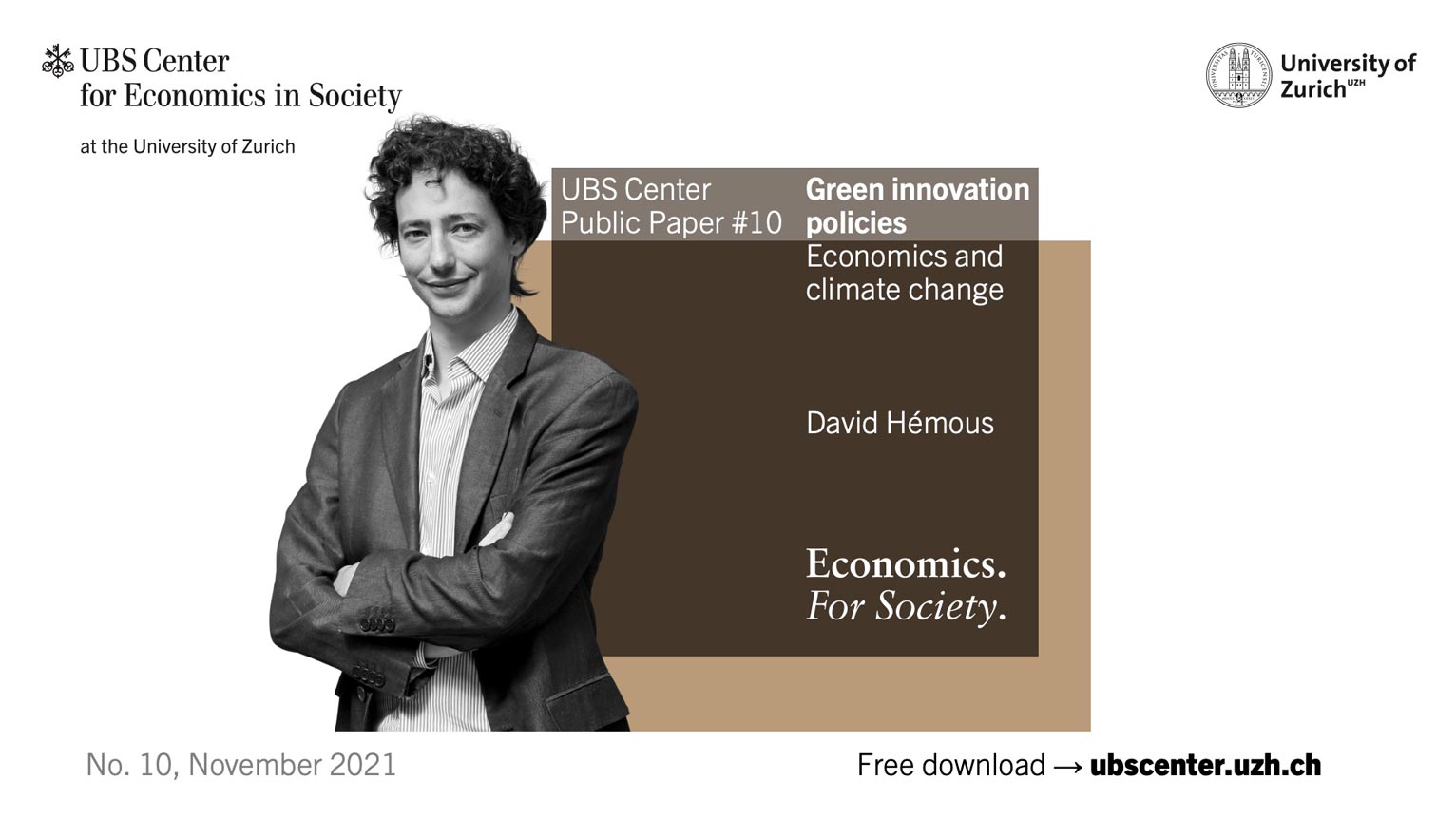
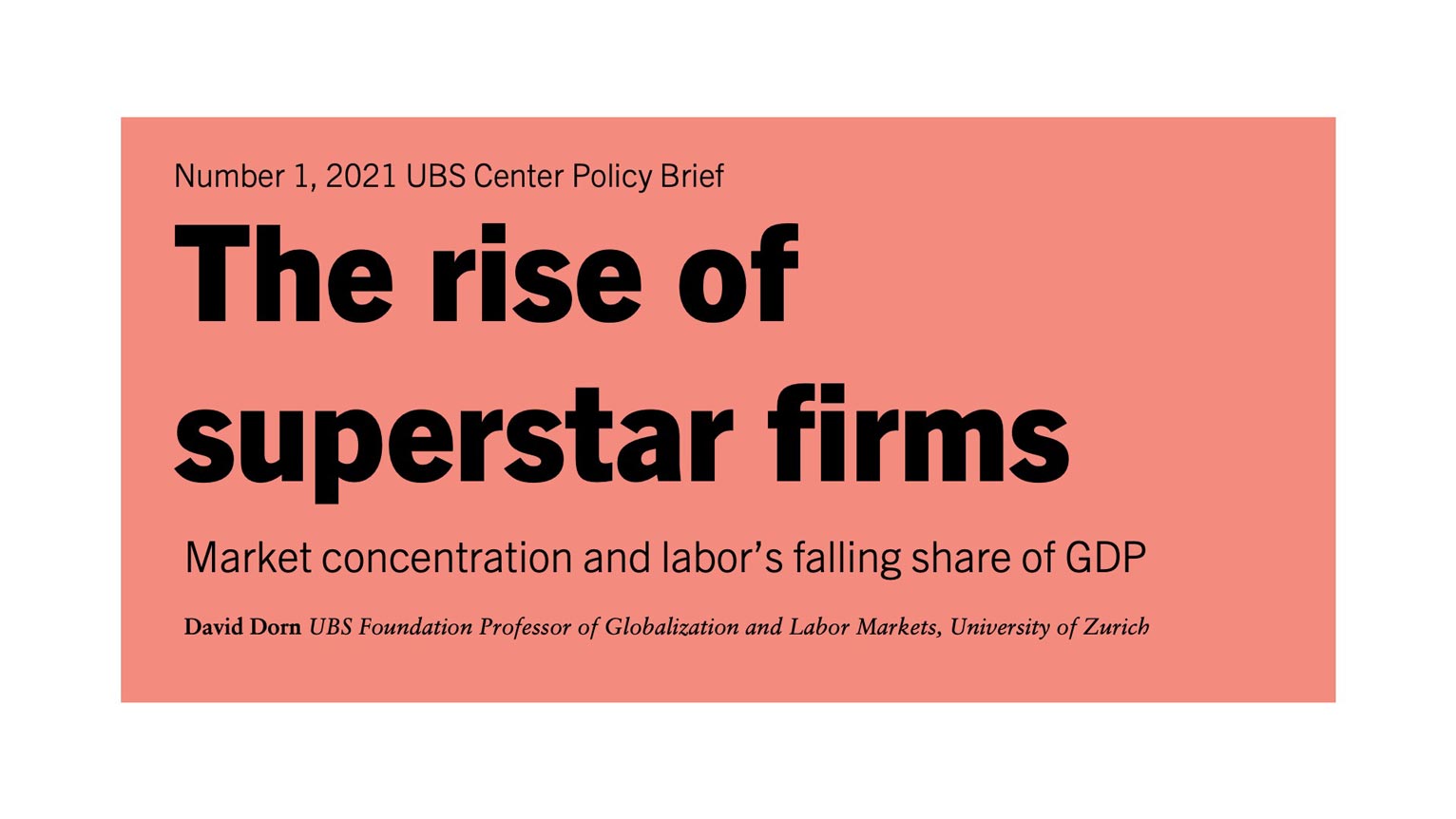
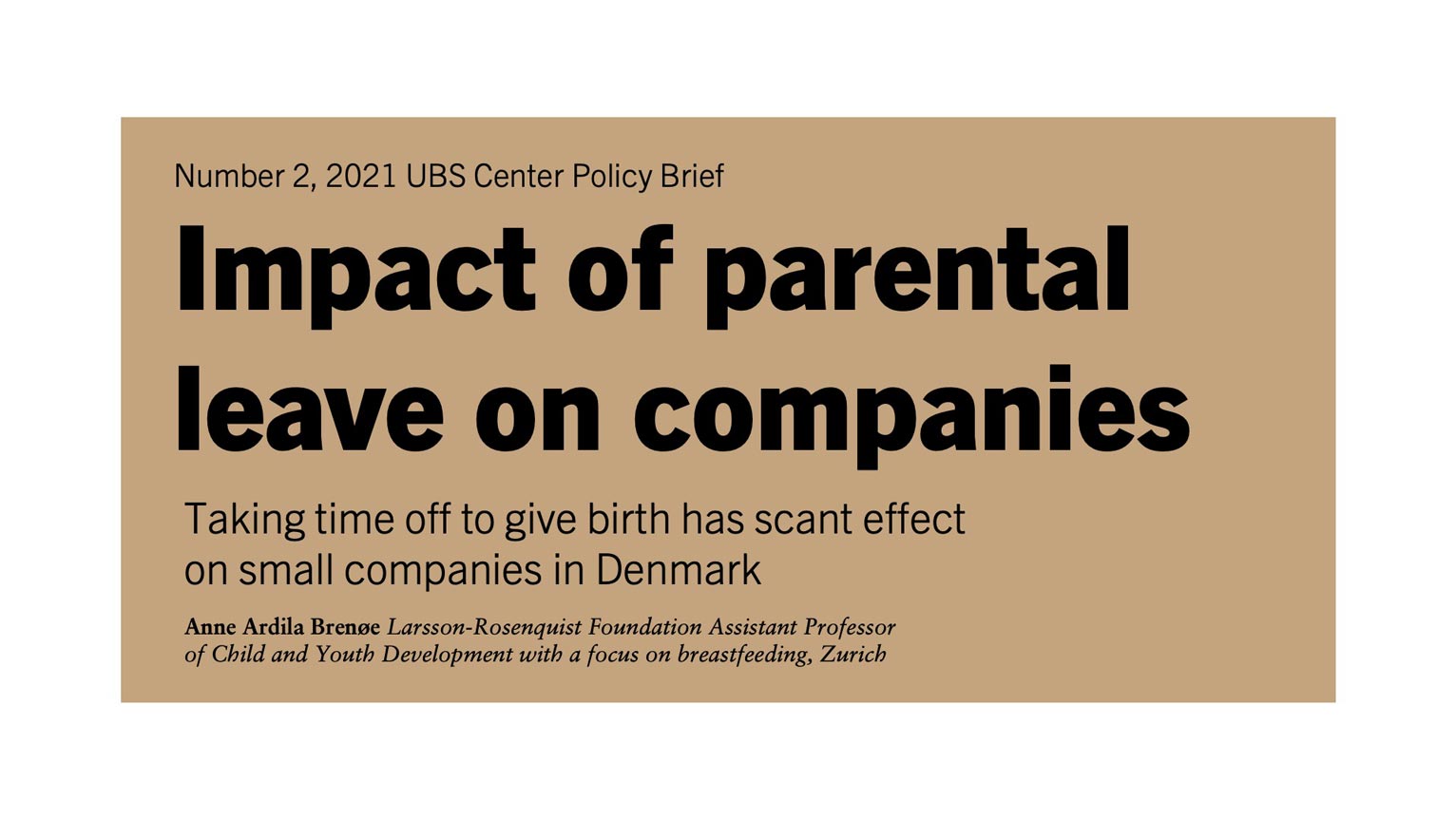
Top five publications
Alós-Ferrer, Carlos; Fehr, Ernst; Netzer, Nick (2021). Time will tell: recovering preferences when choices Are noisy. Journal of Political Economy, 129(6):1828-1877. download
Fehr, Ernst; Powell, Michael; Wilkening, Tom (2021). Behavioral constraints on the design of subgame-perfect implementation mechanisms. American Economic Review, 111(4):1055-1091. download
Ambühl, Sandro; Bernheim, B Douglas; Ockenfels, Axel (2021). What motivates paternalism? An experimental study. American Economic Review, 111(3):787-830. download
Committed to world-class research
Ushering in a new decade
With the end of the year, a whole decade lies behind us – full of enthusiasm and commitment for economic research, for the exchange with experts and the public, and for young talents.
Next year we will celebrate our tenth anniversary. On this occasion, we will look back and take stock of what we have achieved so far. At the same time, we look ahead with curiosity and full of verve, looking forward to further exciting projects, new insights, and inspiring encounters.
This year, our community has gained two more valuable members who support our mission to make Zurich one of the best places for research in economics. Nobel laureate Abhijit Banerjee (MIT) and Prof. Imran Rasul (University College London) join the UBS Center as Advisory Board Members.
Ushering in a new decade
With the end of the year, a whole decade lies behind us – full of enthusiasm and commitment for economic research, for the exchange with experts and the public, and for young talents.
Next year we will celebrate our tenth anniversary. On this occasion, we will look back and take stock of what we have achieved so far. At the same time, we look ahead with curiosity and full of verve, looking forward to further exciting projects, new insights, and inspiring encounters.

Events 2022
The Center’s events come in different formats, including two annual conferences with leading representatives from the academic, private, and public sectors debating a key contemporary economic issue. The Opinion events feature top representatives from academia to voice their views in public speeches.
Switzerland as a business hub (Podium, 7.4.2022)
In the new edition of the UBS Center’s very first Podium, we compare the debate’s results of that time with the situation today. What has changed? The main question is as topical as it was then: how can we ensure that Switzerland remains one of the leading business hubs in the future? Keynote speeches by Prof. Gerard Roland (UC Berkeley) and Guy Parmelin, President of the Swiss Confederation. Further speakers will be announced soon.
Behavioral public policy (Inaugural lecture, 16.5.2022)
Sandro Ambühl, UBS Foundation Assistant Professor for Behavioral Economics of Financial Markets, will deliver his inaugural lecture on behavioral public policy with application to finance at the University of Zurich.
Good economics for hard times (Opinion event, 20.6.2022)
In a public lecture at the University of Zurich, Nobel laureates Esther Duflo (MIT) and Abhijit Banerjee (MIT) will offer better answers to our biggest problems.
Digital monopolies (Forum, 7.11.2022)
Our next UBS Center Forum at the Kongresshaus Zürich will focus on the power of tech giants.
The Center’s events come in different formats, including two annual conferences with leading representatives from the academic, private, and public sectors debating a key contemporary economic issue. The Opinion events feature top representatives from academia to voice their views in public speeches.
Switzerland as a business hub (Podium, 7.4.2022)
In the new edition of the UBS Center’s very first Podium, we compare the debate’s results of that time with the situation today. What has changed? The main question is as topical as it was then: how can we ensure that Switzerland remains one of the leading business hubs in the future? Keynote speeches by Prof. Gerard Roland (UC Berkeley) and Guy Parmelin, President of the Swiss Confederation. Further speakers will be announced soon.
